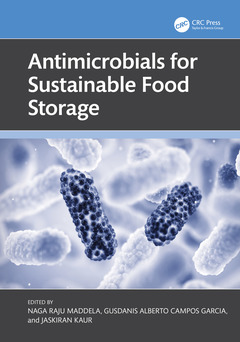Antimicrobials for Sustainable Food Storage
Coordonnateurs : Maddela Naga Raju, Campos Garcia Gusdanis Alberto, Kaur Jaskiran

Finding natural substances is worthwhile in food preservation. The principal motivation behind this edited volume Antimicrobials for Sustainable Food Storageis to collect and present widespread knowledge in the domain of sustainable food ingredients with antimicrobial properties. The book consists of two sections. The first section of this volume is about food ingredients as antimicrobials, and the second section discusses the recent advances in the applications of food ingredients.
Interplay of various environmental factors favor the growth of different microorganisms during the food preservation process. growth of undesirable microorganisms negatively influences the taste, smell, color, and texture of food. Therefore, sustainable food preservation is a challenging issue. Though several chemicals have emerged, inevitable health effects are commonly encountered by food preserve chemicals.
Microbial products (Nisin, enterocin, pentosin, sakacin, and pediocin) have immense importance in prolonging the shelf life of food substances by controlling food spoilage and pathogenic microbes. Yeasts and Cyanobacteria are also potential candidates in the supply of food ingredients with significant antimicrobial properties. However, limited awareness of antimicrobials as food ingredients and the unavailability of a single source of the latest insights on such food ingredients in one place led to the motivation to produce this work.
Key Features:
· Provides insights on natural antimicrobials in food preservation.
· Underlines the importance of sustainable food packaging.
· Offers knowledge on emerging trends in antimicrobial-based food storage.
Diverse applications are covered in different chapters. This book covers various antimicrobials as food preservatives, such as metabolites, natural products, essential oils nanomaterials, L-arginine, polyphenols, phaeophyceae, horchata. There are also chapters that focus on the applicability and prospective studies of essential oils, edible biofilms, biodegradable antimicrobials, and nanostructured lipid carriers in the food sector and the method for encapsulation of antimicrobials.
Section 1: FOOD INGREDIENTS AS ANTIMICROBIALS. Chapter 1. Antimicrobial activity of natural metabolites. Chapter 2. Natural Antimicrobials, Their Sources and Food Safety. Chapter 3. Natural Antimicrobials in Food Packaging and Preservation. Chapter 4. Antimicrobial activity of essential oils: Food aplication and determination methods. Chapter 5. Antimicrobial Agents in Food Preservation. Chapter 6. Antimicrobial Packaging to Preserve Food Quality and Food Self Life. Chapter 7. Antimicrobial nanomaterials in the food industry. Chapter 8. Production of L-arginine by fermentation: its applications as food ingredients and antimicrobials. Chapter 9. Role of Antibacterial Polyphenols (PPS) in Food Preservative Applications and correlated to crystals structures as reference tool. Chatper 10. Bioprospective Value of Phaeophyceae : Antimicrobial Potential, Bioactive Components and its Health Promoting Perspectives. Chapter 11. Antimicrobial activity and potential of the ingredients of horchata – a traditional Southern Ecuadorian Highlands herbal drink. Section 2: APPLICATIONS OF FOOD INGREDIENTS – RECENT ADVANCES. Chapter 12. Antimicrobial potentiality of Endophytes in agriculture, food-nutrition, and packaging. Chapter 13. Microencapsulation of essential oils for food preservation: Methods, Mechanisms and Applications. Chapter 14. Antimicrobial edible biofilms for food packaging – Nano-based technologies. Chapter 15. Spray drying as a tool for the microencapsulation of essential oils as natural food additives. Chapter 16. Emerging Trends in Antimicrobial Use for Sustainable Food Preservation. Chapter 17. Biodegradable Antimicrobials in Food Packaging. Chapter 18. Nanostructured Lipid Carriers (NLCs) for the Aqueous-Based Food Preservation. Chapter 19. Scientific Research on Antimicrobials: Bibliometric Assessment of Contributions in WOS (2000-2021).
Naga Raju Maddela received his M.Sc. (1996–1998) and Ph.D. (2012) in Microbiology from Sri Krishnadevaraya University, Anantapuramu, India. During his doctoral program in the area of Environmental Microbiology, he investigated the effects of industrial effluents/insecticides on soil microorganisms and their biological activities and he is working as Faculty in Microbiology since 1998, teaching undergraduate and postgraduate students. He worked on Prometeo Investigator (fellowship received from SENESCYT) at Universidad Estatal Amazónica, Ecuador during 2013-15, received "Postdoctoral Fellowship" (2016–2018) from Sun Yat-sen University, China. He also received external funding from "China Postdoctoral Science Foundation" in 2017, internal funding from "Universidad Técnica de Manabí" in 2020. He participated in national / international conferences, and presented research data in China, Cuba, Ecuador, India and Singapore. Currently, he is working as a Full Professor at the Facultad de Ciencias de la Salud, Universidad Técnica de Manabí, Portoviejo, Ecuador. He has been actively publishing scientific articles, books (authored and edited) and chapters since 2007. As of now, he published 80 articles, 15 books and 50 book chapters.
Gusdanis Alberto Campos García received his Bachelor's degree in Chemistry (2005) and Ph.D in Chemistry (2012) from Universidad del Zulia, Venezuela. He served as a Full-time Associate Professor of the Academic Unit of Analytical Chemistry, Faculty of Experimental Sciences, Universidad del Zulia, Venezuela (2014-2016). Also, he worked as Research and Development Coordinator at Simsa oil company in Venezuela (2013-2016). Since 2016, he is working as a Principal professor of Laboratory Instrumentation and Toxicology of the Clinical Laboratory course, Faculty of Health Sciences (FHS), Universidad Técnica de Manabí (UTM), Portoviejo, Ecuador. At UTM, he is also serving as a Vice-Dean of Research and Postgraduate of the faculty
Date de parution : 07-2024
17.8x25.4 cm


